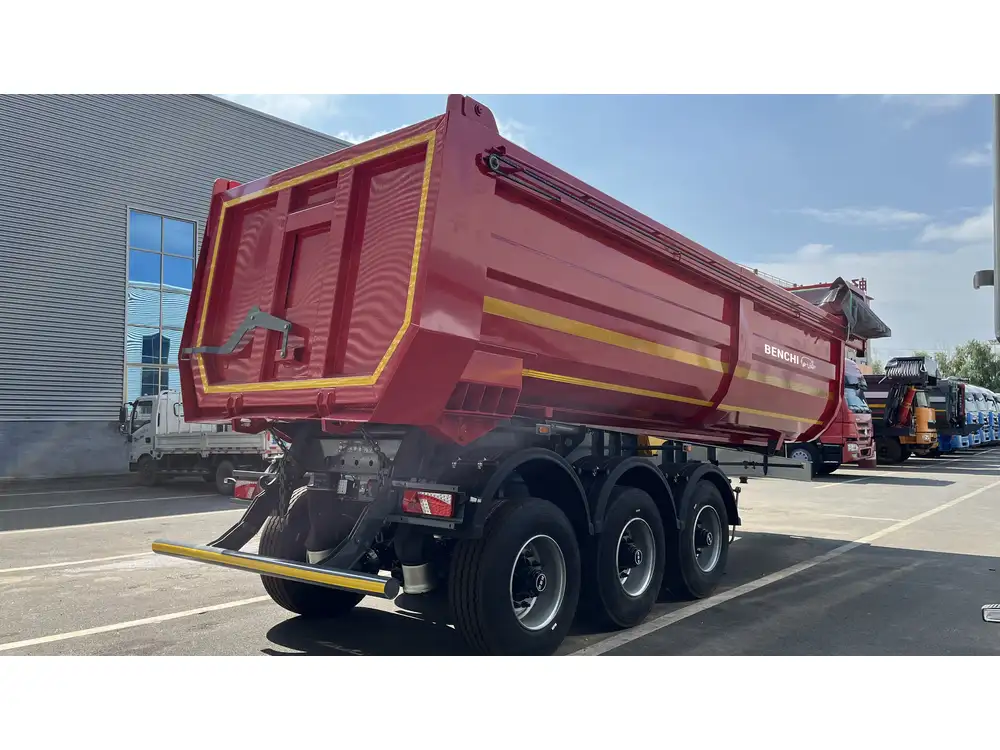When delving into the world of dump trailers, especially a 20-foot variant, understanding its weight is not just a trivial detail—it’s a pivotal factor that influences various aspects from transportation costs to payload capacity. Below, we will conduct an extensive examination of the weight considerations pertaining to a 20-foot dump trailer, alongside related factors that may impact your purchasing decision.
Weight Specifications of 20-Foot Dump Trailers
Average Weight Range
A typical 20-foot dump trailer can weigh anywhere between 5,000 to 7,500 pounds when empty, although this can fluctuate based on the trailer’s construction materials, design, and intended use. The geometric dimensions and load capacity also play significant roles in determining the overall weight.
| Type of Dump Trailer | Average Empty Weight (lbs) | Maximum Payload Capacity (lbs) |
|---|---|---|
| Steel Construction | 6,000 – 7,500 | 14,000 – 15,000 |
| Aluminum Construction | 5,000 – 6,000 | 12,000 – 14,000 |

Factors Influencing Weight
Several variables affect the weight of a 20-foot dump trailer, including:
- Material of Construction: Steel is typically heavier but more durable, while aluminum, though lighter, may not support as much weight.
- Design Features: Trailers equipped with additional features such as dual axles, hydraulic lift systems, or reinforced sides will generally carry more weight than simpler models.
- Manufacturer Specifications: Different manufacturers may follow varied design paradigms leading to weight discrepancies.
Impact of Weight on Transportation and Use
Legal Weight Limits
It is crucial to be aware of the legal weight limits imposed by transportation regulations. For heavy-duty vehicles, the gross vehicle weight rating (GVWR) dictates the maximum operational weight allowed on highways, impacting how much material you can haul.
- Federal Regulations: In the United States, federal regulations stipulate that the maximum allowable weight for a single axle is 20,000 pounds, which effectively means that your 20-foot dump trailer, when fully loaded, must remain compliant with these regulations to avoid hefty fines.
- State Regulations: Additional local regulations may impose different weight restrictions, especially for trucks operating in specific zones. Always consult your local Department of Transportation to ensure compliance.

Transportation Costs
The weight of a trailer also influences transportation logistics and costs:
- Fuel Efficiency: Heavier trailers often result in decreased fuel efficiency. It’s imperative that those utilizing these trailers consider the implications on operational costs.
- Tow Vehicle Requirements: A heavier trailer necessitates a truck with adequate towing capacity. This might require investing in a more robust towing vehicle, thus increasing overall purchase and operational expenditures.
Load Capacity: What You Can Haul
Understanding the weight of the trailer is intrinsically tied to the payload—the total weight of what your trailer can safely carry. A 20-foot dump trailer usually boasts a payload capacity ranging from 12,000 to 15,000 pounds depending on its empty weight.
Safe Loading Practices
To maximize safety and maintain the integrity of your trailer, adhere to the following loading guidelines:
- Distribute Weight Evenly: Ensure that the load is evenly distributed across the trailer to avoid imbalance during transport.
- Adhere to Legal Limits: Stay within both the gross vehicle weight and axle weight limits to avoid penalties and maintain safety.
- Secure Loads Properly: Ensure that all loads are properly secured to prevent shifting during transport, which could lead to loss of control.

Common Uses for 20-Foot Dump Trailers
Construction Sites
One of the most prevalent applications for a 20-foot dump trailer is in construction. These trailers facilitate the movement of materials such as dirt, gravel, asphalt, and debris, enabling efficiency and productivity on-site.
Landscaping Projects
For landscaping professionals, a dump trailer serves as an indispensable tool for transporting soil, mulch, and landscaping stones, simplifying the execution of projects.

Waste Removal
Waste management companies often utilize dump trailers to haul away refuse. They provide a reliable means of transporting bulk waste, making them ideal for both residential and commercial cleanups.
Buying Considerations
Assessing Your Needs
Before making a purchase, evaluate your specific needs. Consider factors like frequency of use, type of materials you’ll transport, as well as the capabilities of your existing towing vehicle.

Budget Implications
Budget plays a crucial role in your decision-making process. Balance the initial investment against long-term operational costs. A heavier-duty trailer may come with a higher price tag but could save you money in the long run through durability and reduced maintenance costs.
Warranty and Support
Select a manufacturer that offers robust warranties and customer support. A longer warranty period serves as an indicator of a manufacturer’s confidence in their product’s durability and reliability.
Customer Reviews and Industry Reputation
Conduct thorough research by reading customer reviews and evaluating the manufacturer’s industry reputation. A company with a solid track record in the trailer manufacturing sector not only ensures quality but also reflects trustworthiness.

Conclusion
Understanding the weight of a 20-foot dump trailer and the various factors affecting it is fundamental for optimizing your investment and ensuring safety. From assessing payload capacity to adhering to legal regulations, making an informed decision can enhance productivity in both professional and personal projects. Engage with knowledgeable manufacturers and review specifications diligently to find the best trailer suited to your needs.
Key Takeaways
- A 20-foot dump trailer weighs between 5,000 – 7,500 pounds on average.
- Understanding payload capacity is crucial for compliance and effective loading.
- Budgeting for both initial costs and long-term operational expenses is essential.
- Evaluate manufacturer reputation and warranty for optimal investment.
Stay informed, and make strategic choices in your trailer purchase to elevate performance and efficiency on every job.



